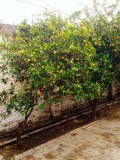‘If you don’t recount your family history, it will be lost. Honour your own stories and tell them too. The tales may not seem very important but they are what binds families and make each of us who we are’
Madeiline Le Ingle
We are all leaves on a tree and there are stories in every canopy.
I remember picking up ‘Footpaths in the Painted City’ by Sadia Shepard about five years ago and becoming instantly absorbed. It was one of those serendipitous library finds, a nugget of gold lodged between the other yellowing paperbacks; the covet of all bookworms.
Sadia Shepard grows up in a multicultural home with a Muslim Pakistani mother and Christian American father. She believes her Nana is Muslim like the rest of her mum’s family until the age of thirteen when she learns that Nana was in fact from a small community of Jews from India who believed they were the shiprecked descendants of the Bene Israel. Her Nana’s dying wish is for Sadia to travel to India and learn of her former life. This is the impetus for a long and fascinating journey through the past.
Moving on, my trip to Pakistan was a sort of venture through my own family’s history. I have always known my grandfather’s war story but to hear it from my grandmother was something special.
Every morning we sat down for breakfast, she would anticipate whether the sun would come out or not, peeking out of the shutters of the house. It was a good day if the sun did make an appearance. She could sit outside, take a walk around the house and go to the back yard to see how the lemons were growing. To be in her company was to perceive the simple things in life with a renewed exuberance.
That morning as we sat under the sun, I asked her about the war. She talked me through Japan’s attack on Hong Kong and her flighty departure home to Pakistan with her toddler son and young brother in law whilst pregnant. My grandfather remained in Hong Kong where he was employed by the British Intelligence.
Upon arriving home safely, she felt relieved knowing little of the gloom ahead.
‘I thought he was dead,’ she said of the time my grandfather was held in Stanley Prison by the Japanese, ‘we heard nothing.’
I could not imagine the crushing helplessness of such a situation, to think that anything could be happening to a loved one so far away from help or home. But when I look at her she seems an unbeaten stoic, incapable of the sinking feeling I have right now in the pit of my stomach. There is something powerful about a grandparent sitting with you and recalling the trials life dealt them. It makes you feel part of something greater, appreciative and more capable of dealing with your own trials, current and imminent. It made me feel strong.
‘When did you find out he was alive?’
‘It was roujah (Ramadhan). There was a telegram and someone came to the door to tell me.’
‘What happened?’
‘There was such khushalee (happiness) that I forgot to break my fast.’
I smile at this because she could not have said anything else that would have given me a more vivid picture of what that day must have been like. A dead man had come back to life.


